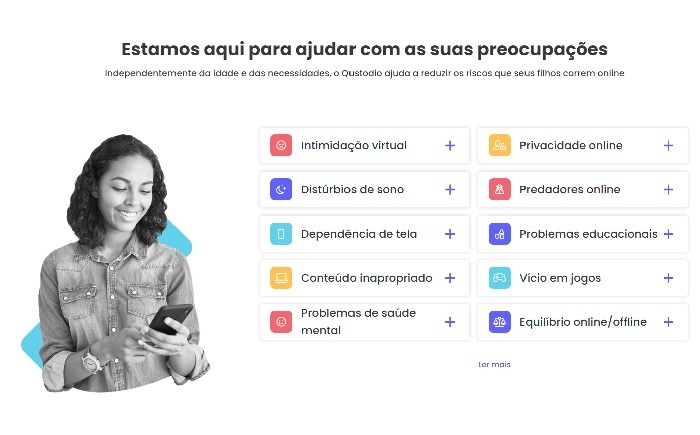Are child monitoring apps legal?
In recent years, the popularity of family tracking apps such as mSpy, Eyezy, and Qustodio has grown significantly. These tools allow families to keep track of what their children are doing online. But are child monitoring apps legal?
Access to smartphones, tablets, and other devices with a screen has become increasingly common early in people’s lives. According to a study conducted by Kaspersky, 49% of children used these devices for the first time before the age of 6. Often this use is to consume content on social networks such as TikTok, a Chinese platform not recommended for children under 13 years old.
On the other hand, Internet security is a constant concern for parents, as it is a virtual environment that can present various risks and threats, even for adults. With this scenario, it is natural for parents to be concerned about what their children are doing online, as it is important to protect them from inappropriate content and dangerous situations.
Are monitoring apps allowed?
Currently, there is a huge variety of parental control “spy” apps available to parents to control what their children consume on the internet. Here at AppTuts we already show you the 10 best free parental control programs.
Despite the great diversity of applications available, there are still many doubts and uncertainties regarding their use. Many users feel guilty about interfering with their children’s privacy and are not sure whether these child-monitoring apps are really legal.
The use of spy apps is prohibited when installed on third-party devices, such as a spouse’s or partner’s cell phone or tablet, without their knowledge or consent. In these cases, installing the application can constitute the crime of invading a computer device, since the individual’s privacy is being violated.
However, regarding the use of this type of application on devices for children and adolescents, the situation is different, since the devices belong to parents or legal guardians.
Can parents monitor their children online?
The answer is yes, child monitoring apps are cool. In this case, guardians are allowed to install monitoring and parental control applications on their children’s devices, provided they are used in an ethical manner, with the purpose of protecting the safety and well-being of children and adolescents.
In most countries, including the US, it is entirely legal for parents to use monitoring apps on their children’s smartphones, as long as they are minors. However, once they reach adulthood, it becomes illegal to do so without their consent.
However, it is important to be careful not to abuse the information obtained through these applications. Especially when we are talking about teenagers, it is essential to respect their right to privacy, considering that they are in a transitional phase towards adulthood and need space and autonomy to develop their personalities.
According to experts, more intensive use of monitoring apps is recommended for children under 10 years old, in order to ensure their online safety.
On the other hand, in the case of teenagers, the ideal is that parental control is reduced and dialogue is encouraged so that they can develop critical thinking about the use of technology and become responsible for their own choices and online behavior.
Also check: TikTok parental control: how to use it? [Full Guide]
What are the risks that children and adolescents run on the internet?
The internet is a tool that offers many opportunities for learning, fun, and socializing. However, for children and teenagers who surf without proper supervision, this virtual environment can be extremely dangerous. Among the risks are:
- Cyberbullying: is a type of bullying that occurs through digital means, such as social networks. Children can be bullied through negative messages, posts, or comments, which can affect their self-esteem and mental health.
- Exposure to violence: contact with violent or disturbing content while surfing the internet. Exposure to violent images and videos can affect children’s mental health, increasing the risk of inappropriate behavior.
- Contact with strangers: unfortunately it is common for malicious people to hide on social media platforms, online games, and chat applications. They get close to children and gain their trust, before exploiting them emotionally or sexually.
- Inappropriate content: not everything on the internet is suitable for consumption by children and adolescents, especially content that promotes inappropriate or potentially dangerous behavior.
- Frauds and scams: Just like adults, children can be the target of online fraud, such as phishing scams, and requests for money or personal information, which can expose not only the child, but his entire family.
Should I control what my kids do on the internet?
While trust between parents and children is essential, experts recommend that you be aware of the websites your children visit and interact with. Don’t forget those apps to monitor children are legal and should be used in favor of your family.
In this sense, it is important that parents encourage responsible and safe use, educating their children about possible online threats and the precautions they should take to protect their privacy and security when they are on social networks, for example.
In addition to staying informed about their children’s online activities, it is crucial for parents to establish open communication with them. The aim is to establish clear rules and appropriate limits for Internet use.
These rules may include, for example, usage time limits. In addition, also the type of content they can access, sites that should not be used, and inform when sharing personal information.
Also, check: Parental control software: check out the top 11 in 2023!






